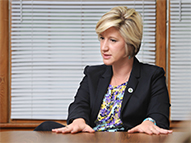
Contact: Brad Lifford
December 20, 2010
JOHNSON CITY When it comes to indoor tanning, mothers can have a seismic effect on whether their daughters adopt the practice, according to a new study by researchers at East Tennessee State Universitys College of Public Health.
Katie Baker, a second-year doctoral student in the College of Public Health, published her findings in the current issue of Archives of Dermatology, a journal of the American Medical Association that provides information concerning the skin, its diseases, and their treatment. Her co-authors are Dr. Joel Hillhouse, a professor in the ETSU Department of Community Health, and Dr. Xuefeng Liu, an assistant professor in the Department of Biostatistics and Epidemiology. Hillhouse is also director of the ETSU Skin Cancer Prevention Lab, where Baker is a graduate assistant.
In a study of more than 200 female college students, Baker uncovered some striking trends among young women who, after reporting to be tanners, said their first indoor tanning encounter was a shared mother-daughter experience.
Of those in the study who were current indoor tanners, 39 percent said they accompanied their mothers that first time and 32 percent of those women became heavy tanners. They were also 4.6 times more likely to be heavy, current tanners than those whose initial indoor tanning experience was alone or with someone other than their mother.
Skin cancer is the most rapidly growing cancer in the nation, particularly among women ages 15-39, Baker said, citing data from the World Health Organization and the International Agency for Research on Cancer (IARC).
When Dr. Hillhouse and I started looking at the data, the numbers just jumped right out at us, Baker said. It comes down to behavioral modeling and permissiveness if a mother expresses permissiveness toward the behavior, the daughter is more likely to adopt it. Another little snippet we found is that women who started indoor tanning with their mothers started tanning two years earlier than women who went by themselves or with a friend. The average age for those women who started earlier was 14.5.
And if you think about that, it makes sense. Youre 14, and you dont have any money; you dont have your own car. Youre able to start earlier because mom is supplying the money and the transportation.
Baker stressed that Hillhouses research has shown parents are willing health educators when it comes to their children. Statistics from the IARC reveal that women who began indoor tanning before the age of 35 have a 75 percent increased risk of melanoma.
Along with parents, physicians, too, can educate young patients and parents against those dangers, Baker said. She said Archives of Dermatology is the ideal publication for the ETSU paper.
Thats why we submitted this to the Archives of Dermatology, because they have a physician-based audience, Baker said. We think physicians should stress to parents the roles they play in influencing their daughters decision on whether to begin indoor tanning.
A Greeneville native, Baker has been on the academic fast track from the outset of her college career. After earning her bachelors degree from Furman University and a masters in public health from the University of Alabama-Birmingham, she returned home to Northeast Tennessee and ETSU. She is the first Niswonger Foundation Scholar in the ETSU College of Public Health and a Quillen Scholarship recipient. Baker also recently received the Outstanding Doctor of Public Health Student Award.
Katie holds the distinction of being an alumna of the Niswonger Scholars Program, and she was an exemplary member of this group during her four years of undergraduate study, said Dr. Nancy Dishner, director of Scholarship and Leadership Training for the Niswonger Foundation. Now, we are very proud that Katie is a rising star in the field of public health.
Baker said her formative years heightened her interest in the research project.
I grew up in a community where indoor tanning is prevalent, so this project means a lot to me, Baker said. Ive developed a passion for protecting the health of young women.



